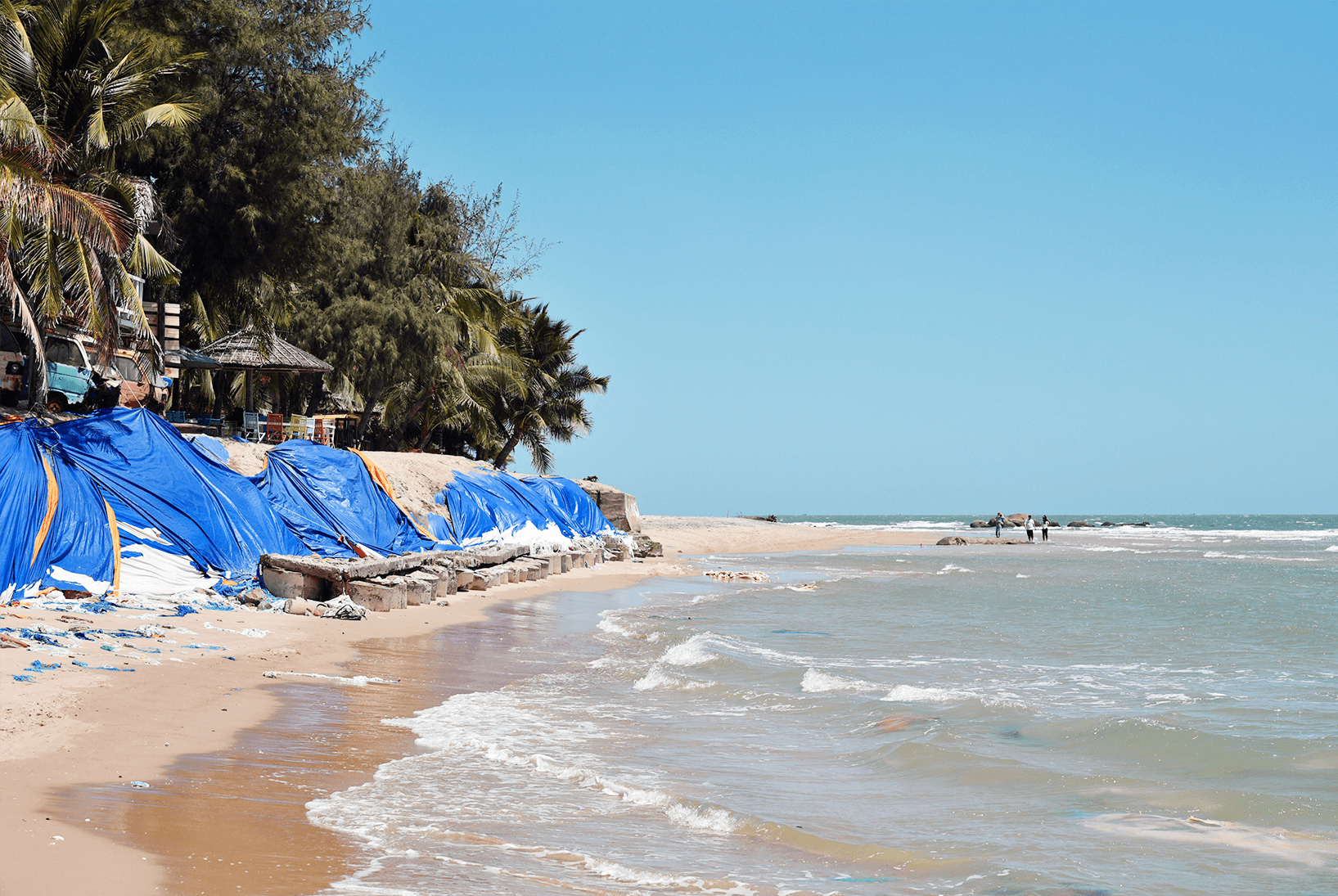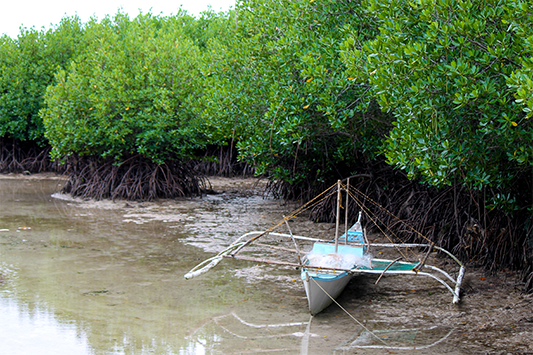WARM facility
The WARM Facility aims to strengthen the resilience of populations and economic activities to water-related climatic hazards, by supporting provinces and cities to become more resilient to climate change and natural disasters and promoting integrated management of water resources and coastal areas.
Local context
Vietnam is one of the countries most severely affected by climate change and natural disasters. Rising temperatures and sea levels, as well as the increased frequency and intensity of extreme weather events, combined with population growth and rapid urbanization, increase the risk of coastal erosion, flooding and drought. Therefore, sustainable water and natural resources management has emerged as a critical challenge for cities, rural and urban areas. In line with their international commitments on climate change and the Sustainable Development Goals, the European Union (EU) and Agence Française de Développment (AFD) actively support Vietnam in the areas of climate change mitigation (energy transition) and adaptation by 2050.
Objective
The WARM Facility focuses on the main priorities of the country in terms of climate change adaptation, through resilient cities in response to water-related hazards. It contributes to the implementation of #Global Gateway Strategy launched by the EU since 2021 to provide the framework for the EU's external action in an evolving international context, and deepen EU's engagement to accelerate investment in quality infrastructure in low-and-middle income countries and strengthen the global economy.
The WARM Facility, a grant of 20 million euro financed by the EU, is dedicated to AFD for management and implementation. It supports the preparation and implementation of infrastructure investment projects in the areas of water and natural resources management, to strengthen the Vietnam's resilience to climate change. These investment projects are co-financed by AFD loans and Vietnam’s own resources over the period 2021-2029, for a total estimated amount of 200 million euro.
The technical assistance financed by the WARM Facility allows long-term in country capacity of the main stakeholders involved in the project implementation and infrastructure management.
Finally, the experiences gained from these projects feed into the sectoral policy dialogue of the EU and AFD with the government on the climate, environment and natural resources management through cross-cutting activities, such as technical exchanges and thematic workshops.
The WARM Facility, a grant of 20 million euro financed by the EU, is dedicated to AFD for management and implementation. It supports the preparation and implementation of infrastructure investment projects in the areas of water and natural resources management, to strengthen the Vietnam's resilience to climate change. These investment projects are co-financed by AFD loans and Vietnam’s own resources over the period 2021-2029, for a total estimated amount of 200 million euro.
The technical assistance financed by the WARM Facility allows long-term in country capacity of the main stakeholders involved in the project implementation and infrastructure management.
Finally, the experiences gained from these projects feed into the sectoral policy dialogue of the EU and AFD with the government on the climate, environment and natural resources management through cross-cutting activities, such as technical exchanges and thematic workshops.

Structure
- Component 1. Project Preparation Support. Through this component, the WARM funds are used to structure the demand of local authorities and enhance the quality of the preparatory studies for projects that could emerge and that would meet the objectives of the Facility. It ensures that local authorities and relevant Vietnamese partners maximize the environmental and social impacts of the projects prepared and succeed in obtaining financing for significant water and natural resources management projects.
- Component 2. Project Implementation Support. This component will help to increase capacity for the local partners/authorities to achieve the highest result from implementing
- Component 3. Investments using AFD’s loans and Vietnamese authorities to finance the investments in infrastructure for several projects with local authorities in the fields of integrated coastal zone management, integrated water resources management and natural disasters and climatic hazards prevention in vulnerable territories, including cities);
- Component 4. Sectoral Policy dialogue, cross-cutting issues and capitalization to support policy or strategic dialogue, to improve the knowledge in the thematic sectors concerned by the Facility, to ensure the communication and the visibility of the projects funded and to improve coordination and accountability.
WARM Impacts
Economically, full advantage of the natural resource management is taken along with assurance of economic and financial profitability and sustainability of the investments. Socially, WARM helps to maximize the social impact of investment projects through the support of structural social improvements, such as gender equality or participative planning and management of the natural resources or infrastructures. The need of all users of the natural resources (water, land and/or forest), including marginalized and poorer user groups, is taken in consideration in allocating the natural resources. This will contribute to prevent conflicts among natural resource users, which are a major challenge in a context of climate change.
WARM is critical in leveraging AFD funding for projects improving the resilience of territories/cities.
WARM is critical in leveraging AFD funding for projects improving the resilience of territories/cities.

WARM NOTABLY CONTRIBUTES TO:
- Improve the resilience of communities and their livelihoods in areas vulnerable to climate change.
- Reinforce integrated management of water-resources in river basins, coastal zones and urban areas.
- Support sectoral policy and strategic dialogue related to water and natural resources management.
In short, the expected impact of the Facility is to improve the resilience of Vietnamese vulnerable areas to water-related climatic hazards, through faster and more efficient projects at local level and the integration of projects results into policies at national level.
About the European Union
The European Union is an economic and political union of 27 European countries. It acts globally to promote sustainable development of societies, environment and economies, so that everyone can benefit.
https://eeas.europa.eu/delegations/vietnam_en
The European Union has issuing in 2021 the #GlobalGateway strategy that provides the framework for the EU’s external action in an evolving international context, to deepen engagement in quality infrastructure in low- and middle-income countries around the world and strengthen the global economy.
Global Gateway (europa.eu)
https://eeas.europa.eu/delegations/vietnam_en
The European Union has issuing in 2021 the #GlobalGateway strategy that provides the framework for the EU’s external action in an evolving international context, to deepen engagement in quality infrastructure in low- and middle-income countries around the world and strengthen the global economy.
Global Gateway (europa.eu)
About AFD (Agence française de développement)
AFD is a public financial institution that finances, supports and accelerates transitions towards a more sustainable world. AFD has financed in Vietnam over 90 projects since 1994 for a total of almost 2.1 billion euros in different sectors: transport, infrastructure, energy and agriculture. In line with the priorities of French cooperation in Vietnam, AFD is positioning its operations to support the implementation of the Paris Agreement
The European Union has issuing in 2021 the #GlobalGateway strategy that provides the framework for the EU’s external action in an evolving international context, to deepen engagement in quality infrastructure in low- and middle-income countries around the world and strengthen the global economy.
https://www.afd.fr/
https://www.afd.fr/

